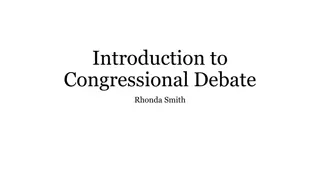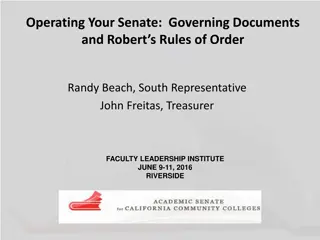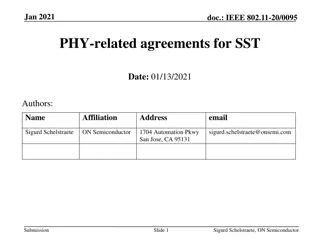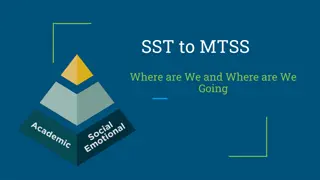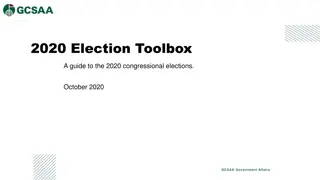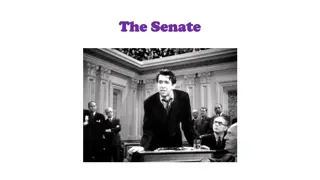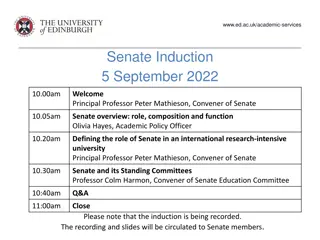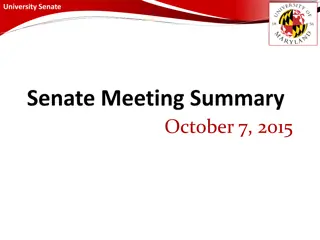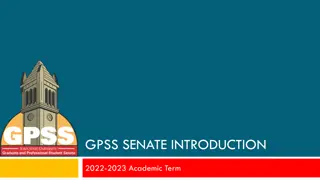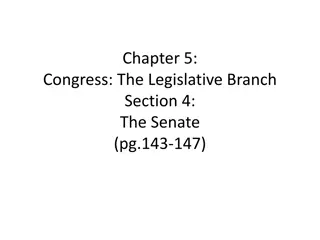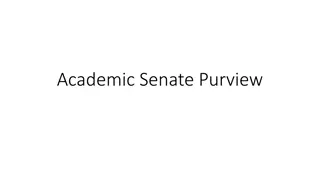Congressional Update: 116th Senate and SST Update
The 116th Congress sees significant turnover with new members less experienced in elected office. The focus for 2019 is on key policy areas like defense, tax, and healthcare. The U.S. Senate composition has changed with 100 Senators, including newly elected members and party shifts. Learn about the structure of the Senate and the Senate Finance Committee’s current ratio under Chuck Grassley's leadership.
Download Presentation

Please find below an Image/Link to download the presentation.
The content on the website is provided AS IS for your information and personal use only. It may not be sold, licensed, or shared on other websites without obtaining consent from the author.If you encounter any issues during the download, it is possible that the publisher has removed the file from their server.
You are allowed to download the files provided on this website for personal or commercial use, subject to the condition that they are used lawfully. All files are the property of their respective owners.
The content on the website is provided AS IS for your information and personal use only. It may not be sold, licensed, or shared on other websites without obtaining consent from the author.
E N D
Presentation Transcript
E-Fairness: Washington Update Prepared for Streamlined Sales Tax Governing Board (SST) May 7, 2019
Congressional Turnover 3 High congressional turnover in the midterm elections, partially due to retirements of long- serving members Congressional candidates today are more likely to have never served in an elected office prior to running for Congress Will new members know about the SST s mission and the SCOTUS decision?
2019 Congressional Outlook 4 Key Policy Focus for 2019: Fiscal Year 2020 Appropriations Defense Reauthorization Judicial Nominations Tax Extenders Trade Healthcare Costs Budget Reform Data Privacy Broadband Deployment Administration Oversight
116th Congress U.S. Senate 6 100 Senators 53 Republicans 47 Democrats (47 + 2 Independents)
8 Newly Elected Senators 7 Seats Flipped FL: Rick Scott (R) defeated incumbent Bill Nelson (D) IN: Mike Braun (R) defeated incumbent Joe Donnelly (D) MO: Josh Hawley (R) defeated incumbent Claire McCaskill (D) NV: Jacky Rosen (D) defeated incumbent Dean Heller (R) ND: Kevin Cramer (R) defeated incumbent Heidi Heitkamp (D) Open Seats (No Party Change) TN: Marsha Blackburn (R) defeated Phil Bredesen (D) UT: Mitt Romney (R) defeated Jenny Wilson (D) Open Seats (With Party Change) AZ: Kyrsten Sinema (D) defeated Martha McSally (R)
Three Rotating Senate Classes 8 Class II (33) Class III (34) Class I (33) Term Expires January 2023 Term Expires January 2025 Term Expires January 2021 12 Democrats 21 Democrats 12 Democrats 22 Republicans 10 Republicans 21 Republicans 2 Independents Note: 6-year terms for all U.S. Senators
Senate Finance Committee Current Ratio: 15-13 9 Republicans Chuck Grassley (IA), Chair (4 C, 6 RM) Mike Crapo (ID) Pat Roberts (KS) Mike Enzi (WY) John Cornyn (TX) John Thune (SD) Richard Burr (NC) Johnny Isakson (GA) Rob Portman (OH) Pat Toomey (PA) Tim Scott (SC) Bill Cassidy (LA) James Lankford (OK) Steve Daines (MT) Todd Young (IN) Democrats Ron Wyden (OR), Ranking Debbie Stabenow (MI) Maria Cantwell (WA) Bob Menendez (NJ) Tom Carper (DE) Ben Cardin (MD) Sherrod Brown (OH) Michael Bennet (CO) Bob Casey (PA) Mark Warner (VA) Sheldon Whitehouse (RI) Maggie Hassan (NH) Catherine Cortez Masto (NV) New Committee Member C = Years as Chair of Committee RM = Year as Ranking Member Committee Seniority over Chair/Ranking Member
Senate Appropriations Committee Current Ratio: 16-15 10 Republicans Richard Shelby (AL), Chair (2 C, 2 RM) Mitch McConnell (KY) Lamar Alexander (TN) Susan Collins (ME) Lisa Murkowski (AK) Lindsey Graham (SC) Roy Blunt (MO) Jerry Moran (KS) John Hoeven (ND) John Boozman (AR) Shelley Moore Capito (WV) John Kennedy (LA) Cindy Hyde-Smith (MS) Steve Daines (MT) Marco Rubio (FL) James Lankford (OK) Democrats Patrick Leahy (VT), Ranking Patty Murray (WA) Dianne Feinstein (CA) Dick Durbin (IL) Jack Reed (RI) Jon Tester (MT) Tom Udall (NM) Jeanne Shaheen (NH) Jeff Merkley (OR) Chris Coons (DE) Brian Schatz (HI) Tammy Baldwin (WI) Chris Murphy (CT) Joe Manchin (WV) Chris Van Hollen (MD) New Committee Member C = Years as Chair of Committee RM = Year as Ranking Member Committee Seniority over Chair/Ranking Member
116th Congress U.S. House of Representatives 12 435 Representatives 235 Democrats 197 Republicans 3 Vacancies
U.S. House of Representatives Overview 13 435 total Members 235 Democrats 197 Republicans (3 Vacancies) ~ 38 seat difference House members run for reelection every 2 years Can be dependent on national trends, more so than Senators House Democrats regained control in 2018 60% of the House Democratic Caucus has never served in the Majority 73% of the House Republican Conference has never served in the Minority 70% of House Republicans have never served under a Republican President
U.S. House of Representatives Overview 14 Democrats picked up a net of 40 seats 43 seats held by Republicans flipped to Democrats CA, IL, IA, ME, MI, NJ, NY, PA, VA 3 seats held by Democrats flipped to Republicans MN and PA 92 confirmed new Members 21% of the House are now newly elected members
House Judiciary Committee Current Ratio: 24-17 15 Democrats Jerry Nadler (NY), Chair Zoe Lofgren (CA) Sheila Jackson Lee (TX) Steve Cohen (TN) Hank Johnson (GA) Ted Deutch (FL) Karen Bass (CA) Cedric Richmond (LA) Hakeem Jeffries (NY) David Cicilline (RI) Eric Swalwell (CA) Ted Lieu (CA) Jamie Raskin (MD) Pramila Jayapal (WA) Val Demings (FL) Lou Correa (CA) Mary Gay Scanlon (PA) Sylvia Garcia (TX) Joe Neguse (CO) Lucy McBath (GA) Greg Stanton (AZ) Republicans Doug Collins (GA), Ranking Jim Sensenbrenner (WI) Term-limited Steve Chabot (OH) Louie Gohmert (TX) Jim Jordan (OH) Ken Buck (CO) John Ratcliffe (TX) Martha Roby (AL) Matt Gaetz (FL) Mike Johnson (LA) Andy Biggs (AZ) Tom McClintock (CA) Debbie Lesko (AZ) Guy Reschenthaler (PA) Ben Cline (VA) Kelly Armstrong (ND) Greg Steube (FL) Madeleine Dean (PA) Debbie Mucarsel-Powell (FL) Veronica Escobar (TX) New Committee Member
House Appropriations Committee Current Ratio: 30-23 16 Republicans Kay Granger (TX), Ranking Hal Rogers (KY) Robert Aderholt (AL) Mike Simpson (ID) John Carter (TX) Ken Calvert (CA) Tom Cole (OK) Mario Diaz-Balart (FL) Tom Graves (GA) Steve Womack (AR) Jeff Fortenberry (NE) Chuck Fleischmann (TN) Jamie Herrera Beutler (WA) David Joyce (OH) Andy Harris (MD) Martha Roby (AL) Mark Amodei (NV) Democrats Nita Lowey (NY), Chair Marcy Kaptur (OH) Pete Visclosky (IN) Jose Serrano (NY) Rosa DeLauro (CT) David Price (NC) Lucille Roybal-Allard (CA) Sanford Bishop (GA) Barbara Lee (CA) Betty McCollum (MN) Tim Ryan (OH) C.A. Dutch Ruppersberger (MD) Debbie Wasserman Schultz (FL) Henry Cuellar (TX) Chellie Pingree (ME) Mike Quigley (IL) Derek Kilmer (WA) Matt Cartwright (PA) Grace Meng (NY) Chris Stewart (UT) Steven Palazzo (MS) Dan Newhouse (WA) John Moolenaar (MI) John Rutherford (FL) Will Hurd (TX) Mark Pocan (WI) Katherine Clark (MA) Pete Aguilar (CA), Vice Chair Lois Frankel (FL) Cheri Bustos (IL) Bonnie Watson Coleman (NJ) Brenda Lawrence (MI) Norma Torres (CA) Charlie Crist (FL) Ann Kirkpatrick (AZ) Ed Case (HI) New Committee Member
E-fairness Legislative Action (2017-2018) 18 SST participated in 121 meetings with House and Senate members and staff in the 115th Congress (2017-2018). SST advised House and Senate stakeholders about SCOTUS amicus brief submissions. Provided feedback about the SSUTA and participating states activities. Tracked e-fairness critics comments and briefs and shared with interested parties. Multiple federal legislative bills were introduced during the 115th Congress. 4 House bills (2 pre-SCOTUS decision, 2 post-SCOTUS decision) 2 Senate bills (1 pre-SCOTUS decision, 1 post-SCOTUS decision) Committee hearings held, but no legislative action taken. House Judiciary Subcommittee on Regulatory Reform, Commercial, and Antitrust Law July 25, 2017 House Judiciary Committee July 24, 2018 Wayfair v. South Dakota SCOTUS decision has not stopped Congressional interest in e-fairness.
Pre-SCOTUS Decision: E-fairness Legislative Action 19 SST advocated for the passage of federal legislation that allows for remote sales tax collection. The Marketplace Fairness Act The Remote Transactions Parity Act Worked directly with all interested stakeholders to achieve the ability to collect sales taxes on remote sales.
116th Congress: SST E-fairness Legislative Position 20 SST is not advocating for federal e-fairness legislation at this time. Let the states demonstrate that they can and will implement this fairly and in a transparent manner. Critics concerns after the announcement of the South Dakota v. Wayfair SCOTUS decision: Retroactivity Small seller exemption levels Implementation dates by the states Creating and implementing new state compacts to streamline sales and use tax systems State overreach
116th Congress: E-fairness Legislative Action 21 SST participated in 21 meetings with House and Senate members and staff in March 2019. Focus: New members of the House and Senate, focusing on SST states and committees of jurisdiction. Multiple federal legislative bills have been introduced at the beginning of the 116th Congress. 2 House bills 1 Senate bill No legislative action taken to date. Focus: Committees of jurisdiction and Fiscal Year 2020 Appropriations Process Wayfair v. South Dakota SCOTUS decision has not stopped congressional interest in e-fairness.
116th Congress: E-fairness Legislative Action 22 H.R. 379, Protecting Businesses from Burdensome Compliance Cost Act Introduced: January 9, 2019 Sponsor: Rep. Bob Gibbs (R-OH) Cosponsors: 1 Republican (Rep. Greg Gianforte (R-MT)) Committee: House Judiciary Committee SST Position: Oppose Key aspects of the bill: Limit the authority of a state to require remote sellers to collect taxes and fees owed by purchasers Single rate per state Single point of collection per state Nexus is referring to physical nexus, not economic nexus
116th Congress: E-fairness Legislative Action 23 S. 128, The Stop Taxing Our Potential (STOP) Act Introduced January 15, 2019 Sponsor: Jon Tester (D-MT) Cosponsors: 4 Democrats (Sens. Jeanne Shaheen (D-NH), Jeff Merkley (D-OR), Maggie Hassan (D-NH), and Ron Wyden (D- OR)) Committee: Senate Finance Committee SST Position: Oppose Key aspects of the bill: Imposes a strict physical nexus standard Overturn the U.S. Supreme Court s decision (Wayfair v. South Dakota).
116th Congress: E-fairness Legislative Action 24 H.R. 1933, The Online Sales Simplicity and Small Business Relief Act Introduced: March 27, 2019 Sponsor: Jim Sensenbrenner (R-WI) Cosponsors: 4 Democrats (Reps. Anna Eshoo (D-CA), Annie Kuster (D-NH), Zoe Lofgren (D-CA), and Chris Pappas (D-NH)) and 2 Republicans (Reps. Jeff Duncan (R-CA) and Mike Gallagher (R-WI)) Committee: House Judiciary Committee SST Position: Oppose Key aspects of the bill: Prevent retroactive collection (prior to June 21, 2018) Sets a small business exemption of $10 million that will be eliminated upon congressional approval of a state compact on simplification Relies on an physical presence concept struck down by the Supreme Court in South Dakota v. Wayfair
SST Action Items 26 State implementation Congressional education Champions development
Questions / Comments Randi Reid Kountoupes Denham Carr & Reid 607 14th Street, NW Suite 750 Washington, DC 20005 (202) 803-4585 randi@kdcrpartners.com www.kdcrpartners.com



